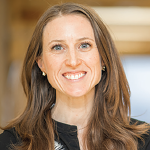“Having a chronic condition, like juvenile arthritis, can be isolating for many kids and teens,” Dr. Lovell says. “At camp, they are surrounded by kids and counselors who understand. It’s a place where, for one week, they can just concentrate on being a kid and having fun with their peers.”
Support
Peter Chira, MD, MS, clinical associate professor of pediatrics and a pediatric rheumatologist at the University of California San Diego School of Medicine, has volunteered with camps through the Arthritis Foundation for the past 16 years. He first began volunteering at camps in Northern California and continued after relocating to Southern California.
“We always encourage rheumatology fellows to attend camp sessions because the experience provides a better understanding of the challenges faced by pediatric rheumatology patients,” Dr. Chira says. “At camp, [the fellows] can interact with patients and see firsthand what the kids are capable of doing from both physical and functional standpoints.”
Seasoned rheumatologists also prove valuable participants at camp, providing medical support if a child suffers an injury and serving as resources at “Talk with Your Doc,” small group discussions that give campers the opportunity to ask doctors and nurses questions they may have about their condition or other health-related matters.
“We field questions on everything from their diagnosis to medication side effects to dating and how to disclose their diagnosis,” Dr. Chira says.
Sometimes, rheumatologists help campers simplify their lives. “I remember one camper who had a very complicated medication schedule that overtook her daily routine; she felt as though she were taking medications all day,” Dr. Chira says. “It was a real eye opener and offered me a chance to talk with her about her feelings about medicine, review her schedule and encourage her family to talk to their doctor about possibly simplifying her regimen to a once-a-day medication instead of [one she had to take] three times a day.”
Dr. Chira says volunteering at camp also gives rheumatologists the unique opportunity to see how their pediatric patients cope with their condition on a day-to-day basis.
“Are they avoiding certain activities because [the activities] cause pain, or are they pushing through the pain because they don’t want to feel left out?” Dr. Chira says. “And if they are [avoiding activities], how can we help them manage their condition better?”
Dr. Chira says he often encourages campers with joint stiffness to perform at-home physical therapy stretches, learn to better self-regulate or switch to less stressful activities.
Enjoyment & Education
Colleen Correll, MD, a pediatric rheumatologist and assistant professor at the rheumatology division in the University of Minnesota in Minneapolis, has been volunteering at Camp Cambria, a six-day residential camp near Maple Lake, Minn., for the past four years.



